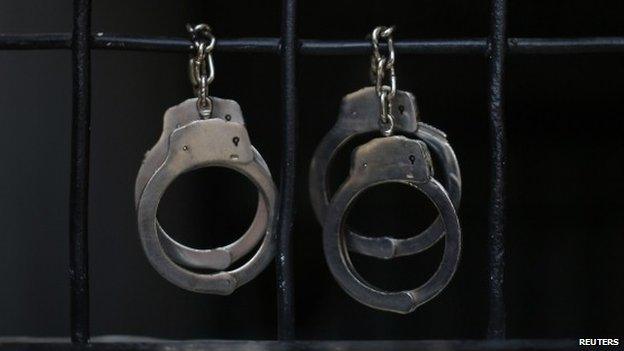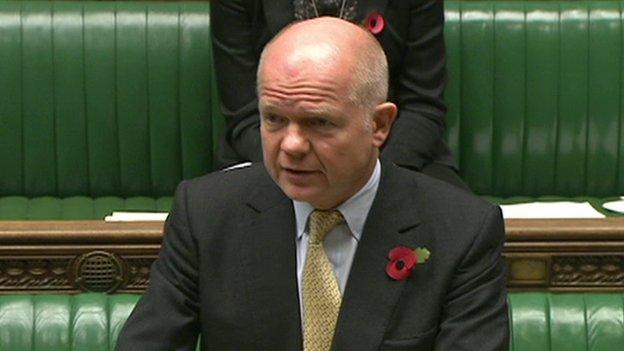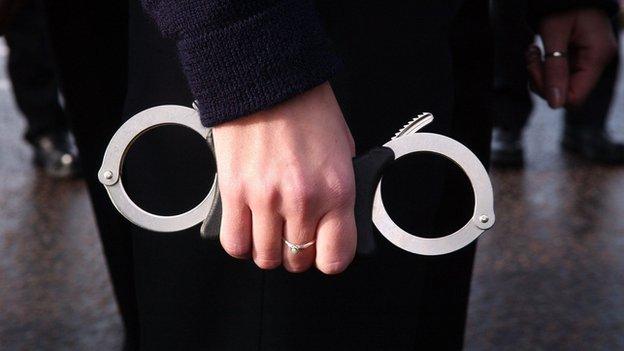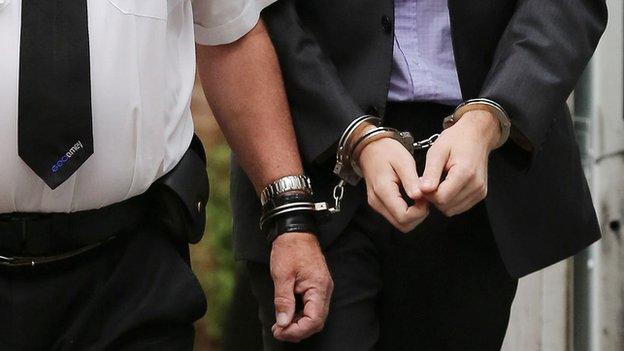European Arrest Warrant: Parliamentary vote announced
- Published
- comments

The government wants to retain the European Arrest Warrant
MPs will vote on Monday on whether the UK should continue using the European Arrest Warrant.
Commons Leader William Hague announced the debate on opting into 35 EU justice measures - including the EAW - that the government wants to retain.
Prime Minister David Cameron is likely to face a backbench rebellion but the measure is expected to pass with Labour and Lib Dem backing.
It came as senior judges said voting for the EAW "was a vote for security".
Under the terms of the 2009 Lisbon Treaty, the UK has to decide by 1 December whether to continue to adhere to the EU criminal justice and law enforcement measures.
The UK has opted out of all 133, but ministers want to retain 35, including the European Arrest Warrant, which allows police to extradite suspects quickly between EU states.

Mr Hague confirmed the date of the vote as he outlined Parliamentary business
Mr Hague confirmed the full-day debate would take place before a Parliamentary committee had agreed the draft proposals, saying this was "unusual" but "not unprecedented".
But Labour's Angela Eagle suggested it was being rushed through because the government was "desperate to get the vote out of the way" because it was worried about a backbench revolt.
Some Conservative MPs feel uneasy about the arrest warrant which they see as a threat to the liberties of Britons and the sovereignty of the UK.
They say UK suspects are often extradited on spurious grounds.
'Safe haven'
But a letter from 40 senior legal figures to the Daily Telegraph, external says the UK risks becoming a "safe haven" for foreign criminals, if MPs do not back the arrest warrant.

European Arrest Warrants
The European Arrest Warrant operates EU-wide and replaced separate extradition arrangements between the EU member states
It was introduced in January 2004, and was prompted by the international anti-terror drive after the 11 September 2001 attacks on the United States
A national judicial authority, such as a court, can issue an EU warrant to get a suspect extradited
For a warrant to be valid, the suspect must be accused of an offence incurring a maximum penalty of at least a year in prison, or must have been already sentenced to at least four months in prison

The letter - which is signed by Lord Phillips, who served as president of the Supreme Court - said: "There is no credible alternative to the EAW."
It says: "Britain can only lead reform of Europe's criminal justice co-operation by being part of the system.
"Britain also risks becoming a safe haven for fugitives from justice, a handful of them British citizens, but the vast majority foreign nationals wanted for crimes elsewhere in Europe."
The letter also references the cases of Hussain Osman, who was convicted after trying to repeat the July 7 terror attacks in London, and Jeremy Forrest, a teacher who was jailed for abducting a schoolgirl.
"Without the EAW other EU members may be unable speedily to extradite suspects like Hussain Osman or Jeremy Forrest to Britain - both in jail after use of the EAW. Unsurprisingly, the Association of Chief Police Officers (Acpo) believes we cannot afford to lose it," the letter says.
Law Society president Andrew Caplen and Sir David Edward, a former European Court of Justice judge, have also signed the letter along with Lord Justice Sir Henry Brooke.
Conservative backbencher Dominic Raab, who wants the UK to leave the EAW system, told BBC Radio 4's The World at One the judges' letter was a "magisterial example of the elite clubbing together to sell out the ordinary citizen".
He said extraditions would take longer outside the EAW, but added: "Let's be clear - that's not a public protection issue, that's an administrative convenience issue."
- Published4 November 2014

- Published5 December 2014
